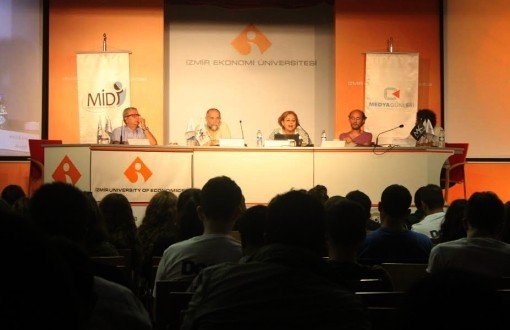Media and Communicators Association (MID), an Izmir province-based NGO aiming to create another media devoid of discrimination and hate speech, kicked off yesterday their second conference entitled “2nd Media Days”.
Held in Izmir Economy University, the conference will resume until Thursday.
MID Chairperson Çağrı Öner made the opening speech, saying that their association has been fighting against various media discourses and aimed to bring a new twist to the communications sector in Turkey.
Following Öner’s keynote, Izmir Economy University President Ekrem Demirtaş reminded that they have been supporting MID since 2010 and expected MİD to continue its efforts.
The first panel of the conference was entitled “Media and Communication Ethics”. Moderated by bianet’s editor-in-chief Haluk Kalafat, the session’s speakers were as follows: journalist Mustafa Alp Dağıstanlı, Ankara University Associate Professor Gülseren Adaklı, Koç University lecturer and Yurt newspaper columnist Cüneyt Ülsever and Emine Uyar from Journalists Union of Turkey (TGS).
While Adaklı provided an theoretical framework on the media ethics, Dağıstanlı summarized the pressures on the media since the Ottoman Empire. Ülsever, on the other hand, mentioned of his experience in his professional life. Uyar’s keynote focused on the relation between journalists’ unionization issue and media ethics. Making the closing speech, Kalafat explained why the term is called not “media morals” but “media ethics”.
Kalafat: “Not media morals, but media ethics”
Before the Q&A session, Haluk Kalafat explained why journalists must be in a constant research while reporting. Reminding that the first conference was also on media ethics, he emphasized that it must be discussed in every conference. He continued as follows:
“We don’t call it media morals. There is a reason why we call it ethics. Morals are a series of realities that a belief system imposes on us unconditionally. Ethics, on the other hand, are open to discussion and in a way, they are entitled to do so. Journalists must depart from questions like ‘Am I doing right?’, ‘Have I left out anything?’, ‘Will it be understood as I am intending to?’. At the end of the day, we can draw a general picture on media ethics but we can’t put a definite set of rules, and we shouldn’t so…Otherwise, we don’t form media ethics but media morals.” (EMŞ-ÇÖ/HK/BM)
* Click here to read the article in Turkish.






